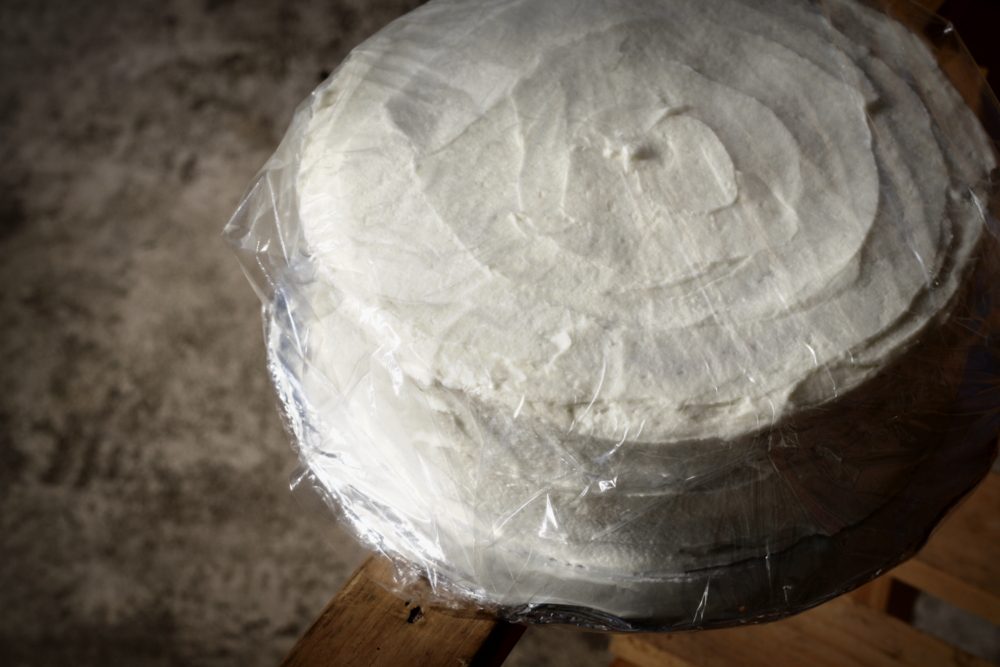 I bought this oversized coffee mug at the Walmart grocery. It makes me happy down to the tips of my toes. I am from a culture of over-abundance, of super-sizing, of excess and indulgence, and all the mini-sized everything—chip bags, meal portions, coffee cups—was cramping my style. I wanted big and bold, so I bought a mug. An entire can of coke, plus ice, fits in it perfectly. This morning, I drank my thermal mug of coffee and then made a pot of half real/half decaf for Jovita and me. I’m drinking two-thirds of the pot in this mug, more than my share, in good old North American fashion. And I’m loving every sip of it.
I bought this oversized coffee mug at the Walmart grocery. It makes me happy down to the tips of my toes. I am from a culture of over-abundance, of super-sizing, of excess and indulgence, and all the mini-sized everything—chip bags, meal portions, coffee cups—was cramping my style. I wanted big and bold, so I bought a mug. An entire can of coke, plus ice, fits in it perfectly. This morning, I drank my thermal mug of coffee and then made a pot of half real/half decaf for Jovita and me. I’m drinking two-thirds of the pot in this mug, more than my share, in good old North American fashion. And I’m loving every sip of it.
I wrote a post the other day that I thought was fairly deep, nearly profound even. But my husband said it was devoid of meaning. I was furious with him, of course, but if he’s willing to run the risk of getting his head chewed off, then I’m smart enough to know I better listen. I didn’t post it.
Which got me to thinking, if that post—it was all about helping and how lots of helping isn’t help at all—didn’t say anything, then what is it I do want to say?
Since coming to Guatemala, I spend a lot of time asking existential questions. This is what happens when I get plucked out of my ordinary and plopped into something very different. What does the Act of Asking Existential Questions look like, exactly? In my case it looks a lot like moping, whining, grumbling, laying on the bed staring at the ceiling, dreaming about Netflix, feeling sad, and wishing for what I can’t have. In general, just a good, all-around case of malaise and discontentment. All my suppressed doubts come roaring to the surface. What is meaningful? What’s my life worth? What does it mean to succeed? (I liked Glennon’s take on success.) Am I indispensable?
That last question popped into my head when I was on the porch this morning, bent double, towel drying my hair after washing it in the pila. The answer was blatantly obvious: my only truly indispensable task is mothering. Yes, I know someone else could take my place need be and do a fine job raising my children to be healthy, well-mannered adults. But of all my tasks, mothering is my only it-needs-to-be-me job. I may pour energy into all sorts of other endeavors—blogging, volunteering, teaching, cooking, etc—and that’s fine and good and healthy (most of the time). But my children need me unlike anybody or anything else. As I mulled over this thought, I noticed that I felt wonderfully, surprisingly, free. My insatiable need to do more, be more, wasn’t a necessity after all. To the contrary, to be me, all I need to do is slow down and be present. I knew this of course—people have preached it from the mountaintops since the dawn of discontent—but I guess I just forgot.
That’s Point Number One. Point Number Two is this: I need to stop thinking I’m 19 years old and start giving myself credit for being an adult.
This epiphany comes from the following work-related questions: why are we here? can we do any good for these people? we don’t even know the culture, so how can we possibly understand what they need?
There is a lot of truth to those doubts. People From The Outside miss a lot. People From The Outside bring a lot more baggage than what United Airlines allows, if you know what I mean. People From The Outside are not God’s gift to the world—the world is God’s gift to them.
But all that aside, I mustn’t discredit what I have to offer. I am educated, hard-working, decently well-read (and exceptionally well-read compared to the people I’m working with), and responsible. I know how to ask questions and think critically. Just because I don’t speak K’ekchi’ or am not a school administrator doesn’t mean I don’t know how to listen. My years of serving on the church council of a thriving Mennonite church count for something. My Biblical studies classes count for something. My hours spent reading, relating, and reaching out count for something. Are my husband and I the best ones, the only ones, who can link the K’ekchi’ Mennonite Church to Mennonite Central Committee? Of course not. But we are the ones who are doing it right now and that’s that.
It’s awkward and scary to talk about my doubts about our work when we have a paying constituency. There’s a good chance it’s really bad, actually. Yet, I need to be honest with myself and with the people who are supporting us. I need to have faith in my doubts.
I’m afraid my husband is going to read this and point out that I’m not saying anything. If he does, he’ll be right, at least in part. Because I’m not detailing my doubts. The truth is, I’m not sure how to articulate them in a healthy way.
Dare I try? Can I do it without offending the masses? Can I do it without hurting people?
I’ll give it a go. Here are four:
*That development work isn’t as helpful as we think. That we could, in fact, be doing more harm than good.
*That if we really cared about the poor, then we’d turn our lives upside down to help the have-nots.
*That development agencies (missions, schools, etc) are businesses, and, no matter how well-intended and noble, businesses are about money.
*That Jesus didn’t have a fund-raising constituency. To the contrary: the people who were supposed to be backing him up, killed him.
Voicing these concerns is scary on many levels. Because see, I like being here! I like it that people are standing behind us with checkbooks and lots o’ love! I like it that people trust us! I like it that people associate me with Doing Good!
But if I’m to be honest, then I have to take a good look at the the underbelly of development work and reconcile it with my pie-in-the-sky ideals.
And if I can’t?
Well, then.
I have no idea who Marianne Moore is (in the age of Google, there is no excuse for not knowing: she’s a poet), but she said something that has always stuck with me: Your thorns are the best part of you.
Until now I interpreted that to mean that I am no better than my thorns. But now I think it means that my poky parts—the things that bother me, my conscience pricks, doubts, and anxieties—are what makes me me. If I face them head on, tell the truth about them (bonus points for tact), take the time to examine and work with them in all their sharp ouchiness, then I am being (cliche alert) The Most I Can Be.
So if I have bothersome questions about the value of development work, rather then pushing them under the rug and giving glossy reports of our activities, I need to scrutinize them because they are my thorns and they are pricking me for a reason.
Life is messy, always. Doing Good is not straightforward or simple. I’m not completely at peace with the value of the work I am doing. And just because I’m not at peace, it doesn’t mean the work doesn’t have value. See? It’s convoluted, and I don’t have answers. (And Husband, if this means that this post says nothing, get over it.)
Also, I am so thankful that we have the opportunity to be here, wrestling, thinking, doing, and growing.
Love,
A Thorny Woman
Ps. Since this post already well exceeds the allotted limit in Blogpostland, I might as well throw in some more stuff. Below are a few articles on the subject of helping and development work. They made me think.
*A former NGO worker wrote about her time in Haiti. Note:
Mennonite Central Committee differs from classic NGOs in that the MCC
volunteers are expected to live, more or less, at the level of their
neighbors. There is an expectation that the workers partner with already
existing organizations (such as Bezaleel), and an understanding that
listening to and learning from is as important as (if not more so than)
teaching.
*My cousin-in-law Kate wrote about short-term service.
One of her readers left a whammy of a comment—don’t miss it (scroll
down almost to the bottom. It’s a long comment, by anonymous).
*Three springs ago, Marisa and Adam came to our house in Virginia to talk about their upcoming term with MCC Nicaragua, and I served them chocolate chunk-red raspberry oatmeal muffins.
Now their term is ending and we are toting six bottles of coveted
picamas hot sauce for them when we travel down to Nicaragua in July. A
couple weeks ago, Marisa wrote about Doing Good. (Considering all the linkage we share, it’s clear that she and I have been mulling over similar issues.)
*My since-college girlfriend is working with MCC in Kenya. She wrote this piece articulating the helping conundrum. There are no easy answers.
*My sister-in-law, living in India, added more fuel to the fire by sending me this link: Proof
that giving cash to poor people, no strings attached, is an amazingly
powerful tool for boosting incomes and promoting development.
*Also pointed out to me by by sister-in-law (the woman is a veritable fount of interesting information), a fascinating NPR podcast on building a school in Haiti: It’s Hard To Do Good.



 I bought this oversized coffee mug at the Walmart grocery. It makes me happy down to the tips of my toes. I am from a culture of over-abundance, of super-sizing, of excess and indulgence, and all the mini-sized everything—chip bags, meal portions, coffee cups—was cramping my style. I wanted big and bold, so I bought a mug. An entire can of coke, plus ice, fits in it perfectly. This morning, I drank my thermal mug of coffee and then made a pot of half real/half decaf for
I bought this oversized coffee mug at the Walmart grocery. It makes me happy down to the tips of my toes. I am from a culture of over-abundance, of super-sizing, of excess and indulgence, and all the mini-sized everything—chip bags, meal portions, coffee cups—was cramping my style. I wanted big and bold, so I bought a mug. An entire can of coke, plus ice, fits in it perfectly. This morning, I drank my thermal mug of coffee and then made a pot of half real/half decaf for 




